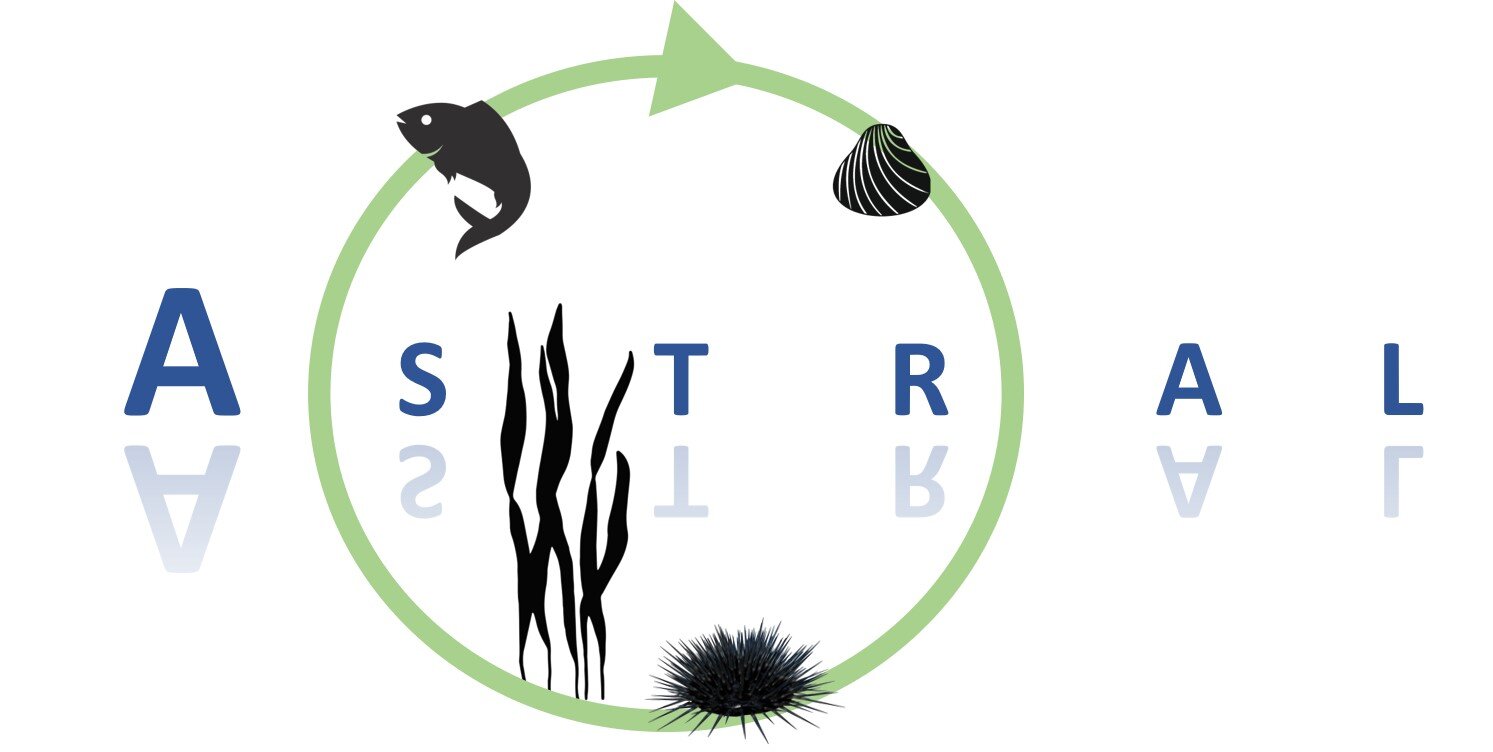ASTRAL's IMTA Labs - towards a sustainable, profitable and resilient aquaculture
Pauline O’Donohoe – (Marine Institute)
To provide for the future food needs of the increasing world population, aquaculture is recognised as being an integral food source. There is a growing demand for more circularity in all cultivation processes and more sustainable production systems across all industries. Integrated Multi-Trophic Aquaculture (IMTA) will be included in this shift to minimise or eliminate impacts, reduce waste, and increase circularity while producing nutritious seafood.
The IMTA concept is a simple process, where multiple aquaculture species are farmed in the same system in a complementary way. The key mechanism of IMTA is the interactions between the species of different trophic levels. The waste produced by the fed species (e.g. fish) is utilised as a feed, fertiliser and energy source for the lower trophic filter-feeding and extractive species (e.g. shellfish and seaweeds). This has the benefit of reducing the environmental load and allowing a more circular and sustainable approach to aquaculture. The waste from the fed fish is in the form of particulate waste (faecal matter, uneaten food) and dissolved matter (metabolic waste (nitrogen), acting as a nutrient source for other species. The particulate waste serves as a food source for filter feeders and deposit feeders, while the dissolved waste serves as nutrients for seaweed growth.
The ASTRAL project (All Atlantic Ocean Sustainable, Profitable and Resilient Aquaculture) (https://www.astral-project.eu/) is currently developing new, sustainable, profitable and resilient value chains for IMTA production. It assesses the added value of the new species and novel species combinations throughout the production cycles, evaluating the potential for productivity, sustainability, profitability, and consumer trust. It is designing and validating innovative technology for monitoring the production and environment.
ASTRAL is working with five IMTA laboratories across the Atlantic basin to assess production cycles, management systems, biosecurity, food safety and profitability. ASTRAL is assessing IMTA circularity to allow the development of a zero-waste strategy. The IMTA labs are assessing the presence of microplastics and microbial communities are being monitored to inform biosecurity and health measures. Life cycle assessments are comparing the environmental impacts of IMTA to those of traditional aquaculture. Affordable sensors and new technologies are being developed to enhance monitoring capabilities for the aquaculture industry.
IMTA lab Brazil is a biofloc system carrying out intensive shrimp production without water renewal by mechanically and biologically removing the accumulation of nutrients excretion/feed degradation and organic matter (biofloc). The integration of species consuming biofloc (tilapia and oysters) and dissolved nutrients (seaweeds and halophytes) is being investigated as an alternative to monoculture to maintain the water quality in the production system.
IMTA lab South Africa incorporates a commercial farm (Buffeljags Abalone) that integrates the cultivation of abalone, in land-based raceway tanks, with the green alga, Ulva, grown in adjacent interconnected paddle raceways using abalone effluent. Ulva serves as a biofilter allowing water from the system to be re-circulated back to the abalone tanks and Ulva is used as a supplementary feed. IMTA lab SA also aims to develop and validate a cost-effective IMTA land-based system for other high-value aquaculture species (sea urchins).
IMTA lab Scotland operates an IMTA open-water system to optimise cultivation techniques of macroalgae and shellfish and demonstrate an improved economic case for the co-cultivation of kelps and native oysters.
IMTA Lab Ireland is developing and validating cost-effective IMTA processes in an open-water system. This IMTA system is exploring the feasibility of the cultivation of Atlantic salmon, lumpfish, European lobster, native oysters, scallops, seaweeds and spiny sea urchins.
Prospective IMTA lab Argentina is gaining knowledge from the other IMTA labs to identify appropriate sites within the Beagle Channel to facilitate IMTA development.
The ASTRAL project has received funding from the European Union’s Horizon 2020 research and innovation programme under grant agreement No 863034





